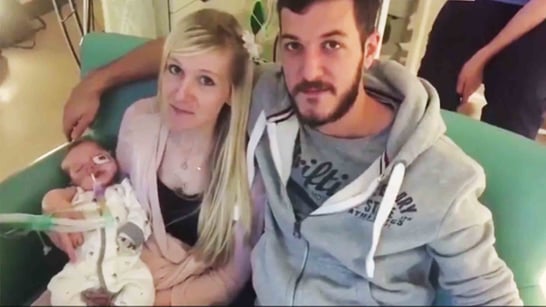 I've read many articles discussing cases of euthanasia, the use of life support, and Death with Dignity. This case involves the life of an 11-month-old boy named Charlie Gard. Charlie's parents, Chris Gard and Connie Yates, are trying to prevent Doctors in London from turning off their son's life support so they can take him to the United States for an experimental treatment. Charlie has a rare degenerative condition called Mitochondrial DNA depletion syndrome.
I've read many articles discussing cases of euthanasia, the use of life support, and Death with Dignity. This case involves the life of an 11-month-old boy named Charlie Gard. Charlie's parents, Chris Gard and Connie Yates, are trying to prevent Doctors in London from turning off their son's life support so they can take him to the United States for an experimental treatment. Charlie has a rare degenerative condition called Mitochondrial DNA depletion syndrome. I've read many articles discussing cases of euthanasia, the use of life support, and Death with Dignity. This case involves the life of an 11-month-old boy named Charlie Gard. Charlie's parents, Chris Gard and Connie Yates, are trying to prevent Doctors in London from turning off their son's life support so they can take him to the United States for an experimental treatment. Charlie has a rare degenerative condition called Mitochondrial DNA depletion syndrome.
I've read many articles discussing cases of euthanasia, the use of life support, and Death with Dignity. This case involves the life of an 11-month-old boy named Charlie Gard. Charlie's parents, Chris Gard and Connie Yates, are trying to prevent Doctors in London from turning off their son's life support so they can take him to the United States for an experimental treatment. Charlie has a rare degenerative condition called Mitochondrial DNA depletion syndrome.Topics: Death With Dignity Act, life support, parental rights, quality of life, euthanasia
 The day I had to put my dog down was an incredibly difficult day. I remember telling my sister-in-law about it and her response was “too bad we can’t do it for our human loved ones”. It was such a strong statement, but I knew where she was coming from. Her mother suffered from Alzheimer’s for close to 10 years and the last few years of her life, she had no idea who any was, not even her beloved children.
The day I had to put my dog down was an incredibly difficult day. I remember telling my sister-in-law about it and her response was “too bad we can’t do it for our human loved ones”. It was such a strong statement, but I knew where she was coming from. Her mother suffered from Alzheimer’s for close to 10 years and the last few years of her life, she had no idea who any was, not even her beloved children. It was cold but the sun was shining when my father looked out the window and said he wanted to die.
He was lying in a hospital bed, tubes tying him to machines and drips. He was 65, wasn’t a smoker but, like a lot of firefighters, had inhaled things that embedded in his lungs, slowly strangling them. His skin was ashen, his eyes wet and hauntingly sad.
When he said he wanted to die, my immediate reaction was to reassure him, to hold his hand, to tell him that my mother, my brother, my sister, and I didn’t want him to go, that we loved him too much to let him go, that he couldn’t go just yet.
That was 29 years ago, and it took me many years to realize that my reaction to my father’s plaintive, death-bed declaration was selfish, that it was rooted in what I thought was best, what I wanted, not what he thought was best, not what he wanted.
My father lingered for several weeks after he told me he wanted to die, suffering greatly. I have no idea if he would have opted to end his life earlier, to end his suffering earlier, but I wish he had the option.
It would be helpful to know whether a majority of Massachusetts legislators think others should have that option, too, but for the last eight years they have punted on the Death with Dignity Act, bottling it up in committee so that it dies without the dignity of a full and fulsome hearing.
Five years ago, a referendum that would make it legal for physicians to prescribe medications that terminally ill people could use to end their lives was narrowly defeated. But, like all social change, like all civil rights, the right to die with dignity is moving forward, inexorably.
Last month, the Massachusetts Medical Society commissioned a survey of its members’ attitudes toward what they called “medical aid in dying.” For a group that has historically opposed what some call physician-assisted suicide, the mere act of seeking its members’ opinions acknowledges the shift, much of it generational, in thinking.
In October, Dr. Roger Kligler, a retired Falmouth physician with prostate cancer, filed a lawsuit asserting he has a right to obtain a lethal dose of medication from a doctor willing to prescribe it if he becomes terminally ill and chooses to avoid more suffering.
Dr. Kligler rightly believes he’ll get a quicker answer from a court than the Great and General Court. As it has with other highly contentious matters, including same-sex marriage and the legalization of marijuana, the Legislature has been more than happy to let the courts or the public do the heavy lifting.
But even if a court agrees with Dr. Kligler’s argument, the decision could be narrowly tailored to only his case. And as the messy rollout of marijuana legalization has shown, legislating complex matters by referendum often leads to convoluted results.
The Legislature needs to take on Death with Dignity, in all its complexity.
Nine years ago, State Representative Lou Kafka sat down with one of his constituents, a guy from Stoughton named Al Lipkind, who was dying of stomach cancer. Lipkind asked Kafka to file a bill that would make it legal for doctors to write prescriptions for terminally ill people who wanted to avoid needless suffering. Kafka refiles the bill every session. The initial dozen co-sponsors have grown to 40.
“Al was able to make me see it through his eyes,” Kafka told me. “Unless and until it becomes personalized, it’s an issue you don’t necessarily think about.”
Not long after Al Lipkind died in 2009, Kafka watched helplessly as the same disease that slowly and torturously killed my dad did the same to his father.
“I watched him gasp for breath,” Kafka said.
Like me, Lou Kafka doesn’t know if his father would have chosen to end his life before enduring months of agony. Like me, he wishes his dad had the option.
Topics: Death With Dignity Act, medical aid in dying, physcian assisted suicide
Brittany Maynard, Death With Dignity Advocate, Dies At 29
Posted by Erica Bettencourt
Mon, Nov 03, 2014 @ 10:52 AM
By Alana Horowitz

Brittany Maynard, the Oregon woman who had become an outspoken advocate for patients' rights following her terminal cancer diagnosis, died on Saturday, the Oregonian reported. She was 29.
"Goodbye to all my dear friends and family that I love," she wrote in a Facebook post, according to People. "Today is the day I have chosen to pass away with dignity in the face of my terminal illness... the world is a beautiful place, travel has been my greatest teacher, my close friends and folks are the greatest givers... goodbye world. Spread good energy. Pay it forward!"
Earlier this year, Maynard learned that she was suffering from an aggressive form of brain cancer called glioblastoma and had only six months to live. After hearing what the disease would to her body in its final stages, she decided that she wanted to die on her own terms.
Maynard and her family, including her husband Dan Diaz and her mother Debbie Ziegler, moved to Oregon,whose Death With Dignity Act has allowed hundreds of terminally ill people to end their lives by taking a medication prescribed by doctors. She picked November 1st as the day she wanted to die because it was after her husband's late October birthday.
Since then, Maynard had become a champion for the law and for patients in her situation, working with the group Compassion and Choices.
"I am not suicidal," she wrote in a blog post for CNN.com. "I do not want to die. But I am dying. And I want to die on my own terms."
On Wednesday, Maynard released a new video that suggested that she might consider postponing her death.
"If November 2nd comes along and I've passed, I hope my family is still proud of me and the choices I've made. If November 2nd comes along and I'm still alive, I know that we'll still be moving forward as a family out of love for each other, and that decision will come later."
Maynard recently crossed the last item off her bucket list: a trip to the Grand Canyon. Before she became ill, Maynard was an active traveler and adventurer who lived in Southwest Asia for a year and once climbed Mount Kilimanjaro.
Source: www.huffingtonpost.com
Topics: nurses, medical, cancer, patients, hospital, advocate, terminally ill, brain cancer, Death With Dignity, Brittany Maynard, terminal cancer, Death With Dignity Act



